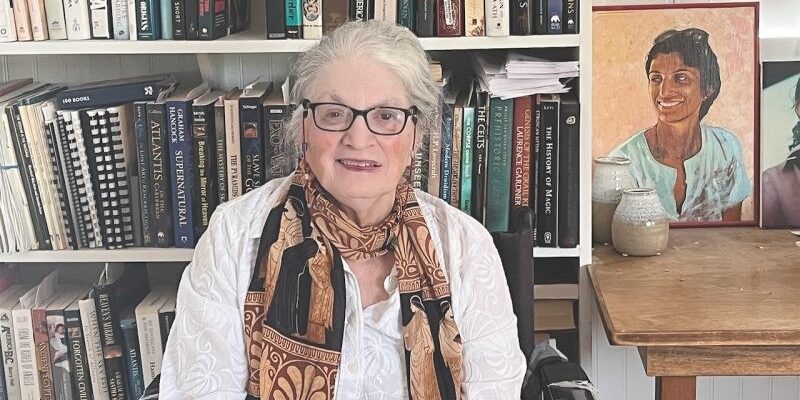An exclusive interview with Charleston Conference founder Katina Strauch as she publishes her memoirs
By Tim Gillett
Introduction
If you have never been to Charleston, you must take a trip down.
A city that is filled with history, its warm and humid air is engulfed in a salty sea breeze; there are cobbled streets and beautiful architecture all around – intertwined with the Low Country’s famous sky-scraping oak trees, covered in Spanish moss.
This is the mesmerising backdrop to the renowned Charleston Conference, an annual gathering of librarians, publishers, electronic resource managers, consultants, and vendors of library materials.
Founded by Katina Strauch in 1980, the event has expanded from 20 participants at its first iteration to around 3,000 – both in-person and online – today. A spirit of camaraderie and collaboration saturates the event – uniting scholarly communication colleagues from across the world every November to share information, inspiration and intelligence.
As a matter of fact, Scholarly Kitchen contributor Joseph Esposito stated that the event is “so well-established, really something of an institution in the library world, that it is difficult to imagine a time when it did not yet exist.”
Books in the blood
On hindsight, it seems almost destined that Katina would be responsible for an event that defines librarianship in the United States and more. Born in 1946 in Columbia, South Carolina, Katina has always loved books and reading – often working as a student librarian.
“I am a Southerner. My father was a researcher and intellectual – he inspired me to be a librarian, and had many women colleagues who were true inspirations to me. I got my Bachelor of Arts in economics in 1969 from the University of North Carolina at Chapel Hill, and then joined the library school at the same institution and received a Masters in Library Science in 1973.”
After her studies, Katina became a librarian in the Nursing School of Duke University, before joining the College of Charleston in 1979 as head of acquisitions for the Robert Scott Small Library. In 1980 she co-authored Guide to Library Resources in Nursing, which was acknowledged by the Association of College and Research Libraries’ Choice magazine as an exceptional reference book.
She remembers: “The contrast between the huge Duke University and UNC-CH and the small College of Charleston was startling; empowering. Basically I was allowed to do my own thing – I loved it!”

“We needed to talk”
It was this instance, being unable to afford the American Library Association’s Annual conference, that Katina came up with her very own event.
“I was a new librarian and trying to get tenure,” she says. “When the Antiquarian Book Fair began in Charleston I saw an opportunity. I had attended many meetings and conferences over the years, and often thought the participants were too self-absorbed; it struck me that there was far too much navel-gazing. I thought that we should talk together – and, as I was basically my own boss and didn’t have anyone looking over my shoulder, I was able to follow my instincts.”
Over the past 45 years, there have been huge differences in scholarly communication. The surprising development of Charleston Conference has happened among notable shifts in the industry – the advent of digital technologies and open access, and the appearance of consortia, and many more.
The event has also been through many challenges: the untimely arrival of Hurricane Hugo as it made landfall as a Category 4 storm in Charleston in September 1989, bringing chaos in the coastal city and pushing boats inland; and Covid in 2020 when events converted from in-person to virtual. Fortunately, the Conference saw a boom in attendance with an almost 150% increase from 2019, and was a huge success despite the many challenges caused by the pandemic.
Unexpectedly, tackling these challenges only brought more success for Katina. In 1989 she published Against the Grain, based on topics in librarianship: “I thought that we needed a way for Conference attendees to keep in touch more often than once a year.” She played a part in establishing The Charleston Advisor in 1999, a piece of work that provides feedback for web products for information professionals.
The Charleston Conference remains the foundation of proceedings – something Katina attributes to being surrounded by a great team: “I’ve worked with great staff and forward-gazing colleagues, and over the years there have been a lot of companies, people, colleagues, and individuals observing what was happening with the Conference. I’ve never met an idea I didn’t like, so together we built conferences, papers, and dialogs that received a lot of attention.”
As a matter of fact, the changes in the communication industry, and librarianship in its extensive form, continue to circle – as they have done for the 45 years of the conference’s continuance.
“The printed book has been replaced by the digital artifact; we’ve seen the advent of personal computers, laptops, cell phones and CDs – Microsoft Windows and Apple Macintosh,” claims Katina. “Innovation has developed massively, and it continues to do so. Then we have Plan S, gadget software, artificial intelligence, and flexible and scalable information repositories. What will be next?”

Memories and memoirs
Katina handed over the Charleston Conference and the related Against the Grain publications to Annual Reviews in 2023. The change saw the release of the digital print Katina, dedicated to and named after the ingenious founder of the Charleston Conference – something she concurs to being “incredibly flattered” by.
Under Annual Reviews, evolution of Charleston extends hastily: along with the release of Katina, plans are in place for the inaugural Charleston Conference Asia – a three-day gathering in Bangkok, in January 2026.
There is no time to rest for Katina. She is embarking on the start of a new publishing company focusing on Southern Literature, along with her memoir: Doing the Charleston – My Personal History of Scholarly Communication, written with Darrell Gunter and published April 2 by Against the Grain Press as a print and open access ebook. It guarantees to be an inspirational read.
Katina does not want to speculate about the future of librarianship, instead quoting the Netherlands author Corrie ten Boom: “Memories are the key not to the past, but to the future”, and Albert Einstein: “I never think of the future; it comes soon enough.”
However, she concludes: “It’s been a grand 45 years.”


